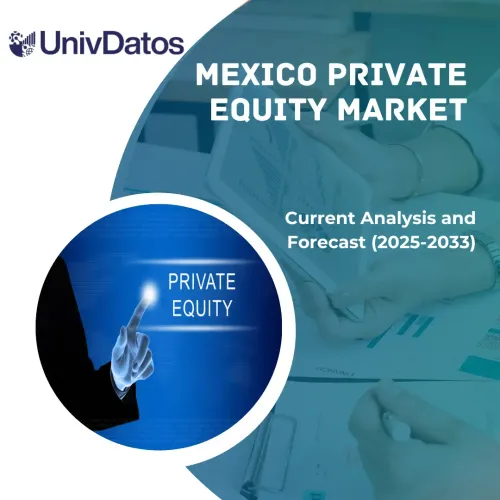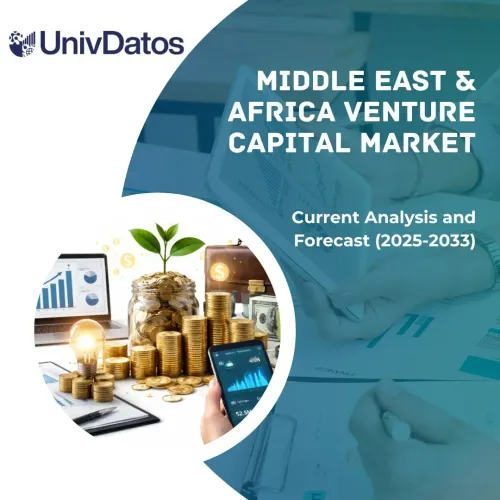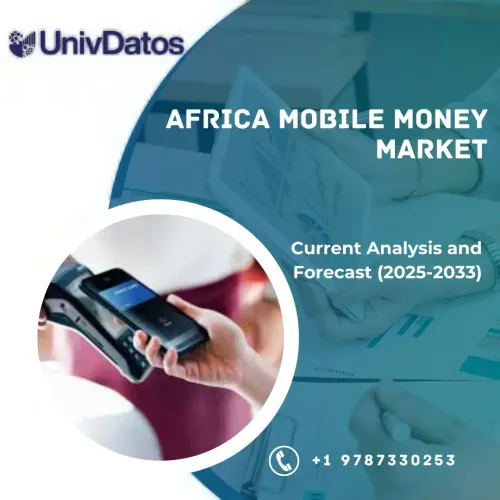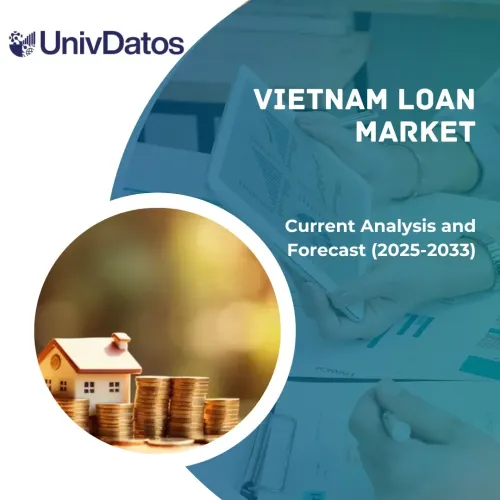- Home
- About Us
- Industry
- Services
- Reading
- Contact Us
India Personal Loan Market: Current Analysis and Forecast (2025-2033)
Emphasis on Type (Secured Loans, Unsecured Loans); Type of Lender (Public Sector Banks, Private Banks, Non-Banking Financial Companies (NBFCs), Others); Purpose of Loan (Debt Consolidation, Home Renovation, Education, Medical Expenses, Others); End-Use (Salaried Individuals, Self-Employed Professionals, Small Business Owners, Others); and Region/States
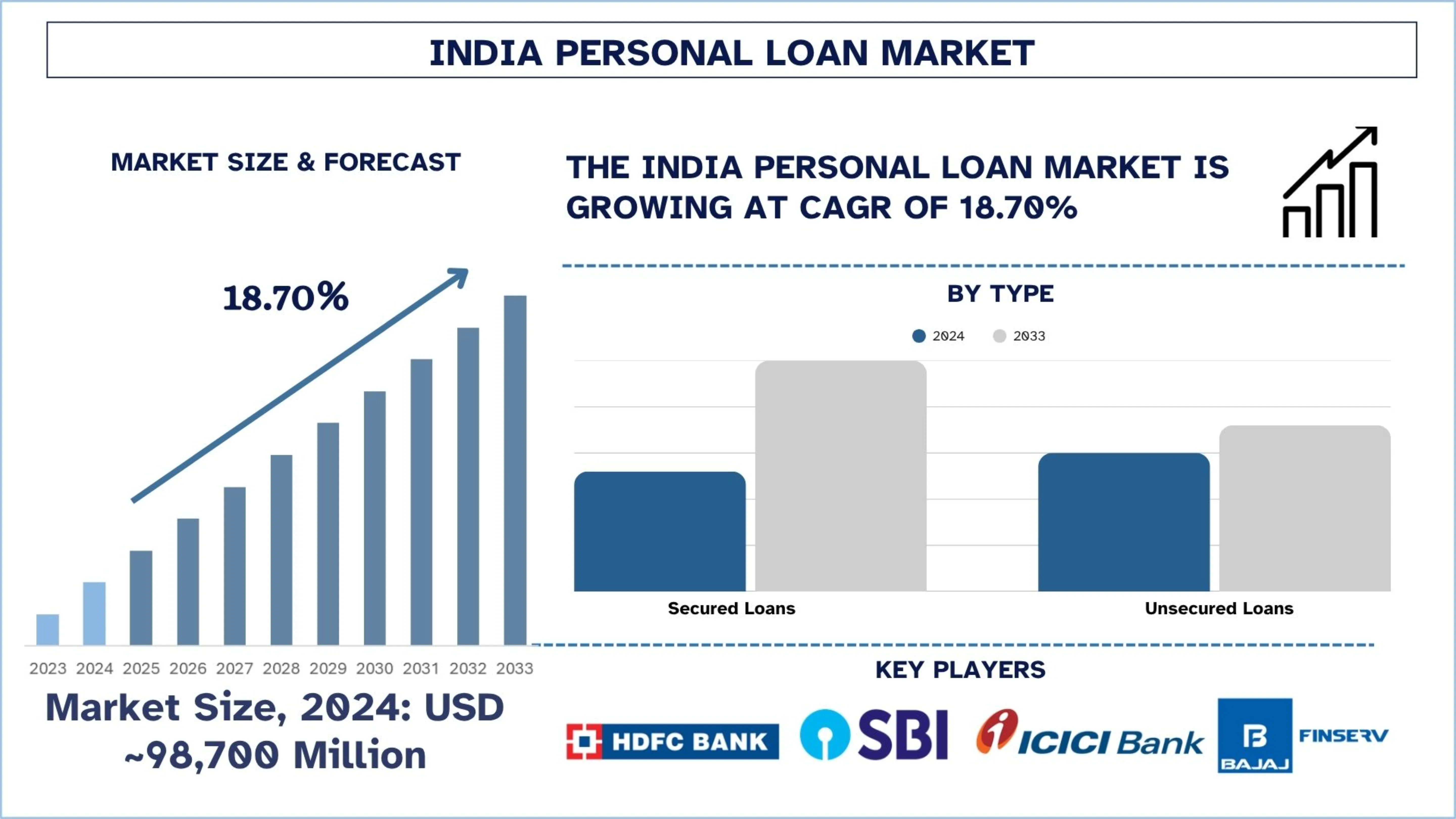
India Personal Loan Market Size & Forecast
The India Personal Loan Market was valued at USD ~98,700 million in 2024 and is expected to grow to a strong CAGR of around 18.70% during the forecast period (2025-2033F), owing to the rising middle class and increasing consumer spending, which are boosting personal loan demand.
India Personal Loan Market Analysis
A personal loan is an unsecured form of credit provided by a financial institution to an individual based on the individual's income, creditworthiness, and repayment capability of the individual. It usually is, for example, for weddings, education, travel, medical crises, or home renovation. A major difference with secured loans is that personal loans don’t need collateral and are repaid in fixed EMIs over a fixed tenure.
To boost the personal loan market in India, companies invest in digital onboarding and real-time loan disbursement technologies that use AI-powered credit scoring models to strengthen business and speed up growth in India’s personal loan market. While FinTech players and NBFCs are extending customized, small-ticket loans through mobile apps to millennials, gig workers, and first-time borrowers, equivalents in the traditional system are struggling to extend a similar facility. But traditional banks are also partnering with FinTechs to help underwrite and get into underserved markets.
For example, India Post Payments Bank (IPPB) and Aditya Birla Capital Limited (ABCL) announced a strategic partnership to broaden the reach and accessibility to loan products across Bharat. Through this collaboration, IPPB will provide referral services for Aditya Birla Capital’s wide range of loan solutions, including personal loans, business loans, and loans against property, to its existing customer base, on May 22, 2025.
India Personal Loan Market Trends
This section discusses the key market trends that are influencing the various segments of the India Personal Loan Market, as found by our team of research experts.
Rise of Embedded and BNPL Lending Models
Embedded lending and Buy Now Pay Later (BNPL) models are changing the way personal loans are sold in India, with credit being sold right on digital platforms like e-commerce apps, travel apps, and fintech apps. These models facilitate instant, small-ticket loans at the point of purchase, thereby levelling up user convenience and increasing transaction volume. For one thing, younger consumers are particularly attracted to BNPL, which offers repayment flexibility and doesn’t require traditional credit cards. Credit has been made more seamless and contextual through these offerings, lending partners are partnering with merchants and tech platforms to scale these offerings. This trend is changing the way consumers view and gain access to personal credit and driving financial inclusion.
Personal Loan Industry Segmentation
This section provides an analysis of the key trends in each segment of the India Personal Loan market report, along with forecasts at the regional and state levels for 2025-2033.
The Unsecured Loans category dominates the Personal Loan market in 2024.
Based on the type, the market is segmented into secured loans, unsecured loans. Among these, the unsecured loans category dominates the Personal Loan market in 2024. The growth can be attributed to the rising demand for unsecured loans, due to minimum documentation, the short processing time, and no collateral requirements. With the provision of small-ticket, instant-type loans, this segment attracts first-time borrowers, the gig workforce, and the younger demographics. The ease of access and digitally friendly nature of fintechs and NBFCs have seen their expansion strategies spread into Tier 2 and Tier 3 cities.
Private banks are expected to grow with a significant CAGR during the forecast period (2025-2033).
Based on the type of lender, the market is segmented into public sector banks, private banks, non-banking financial companies (NBFCs), and others. Among these, the private banks are expected to grow with a significant CAGR during the forecast period (2025-2033). The strong digital infrastructure, pre-approved offerings, and competitive interest rates offer an excellent opportunity for private banks to grow the personal loan market. Their tech-driven underwriting and API integrations make loan disbursal painless, especially for their salaried urban borrowers. The efficiency of this makes private banks central enablers of scale in retail lending. For example, on July 7, 2023, Flipkart entered into a strategic partnership with Axis Bank, which is one of the largest private sector banks, to facilitate personal loans for its valued customers, adding additional convenience and enhanced benefits to its 450 million customers.
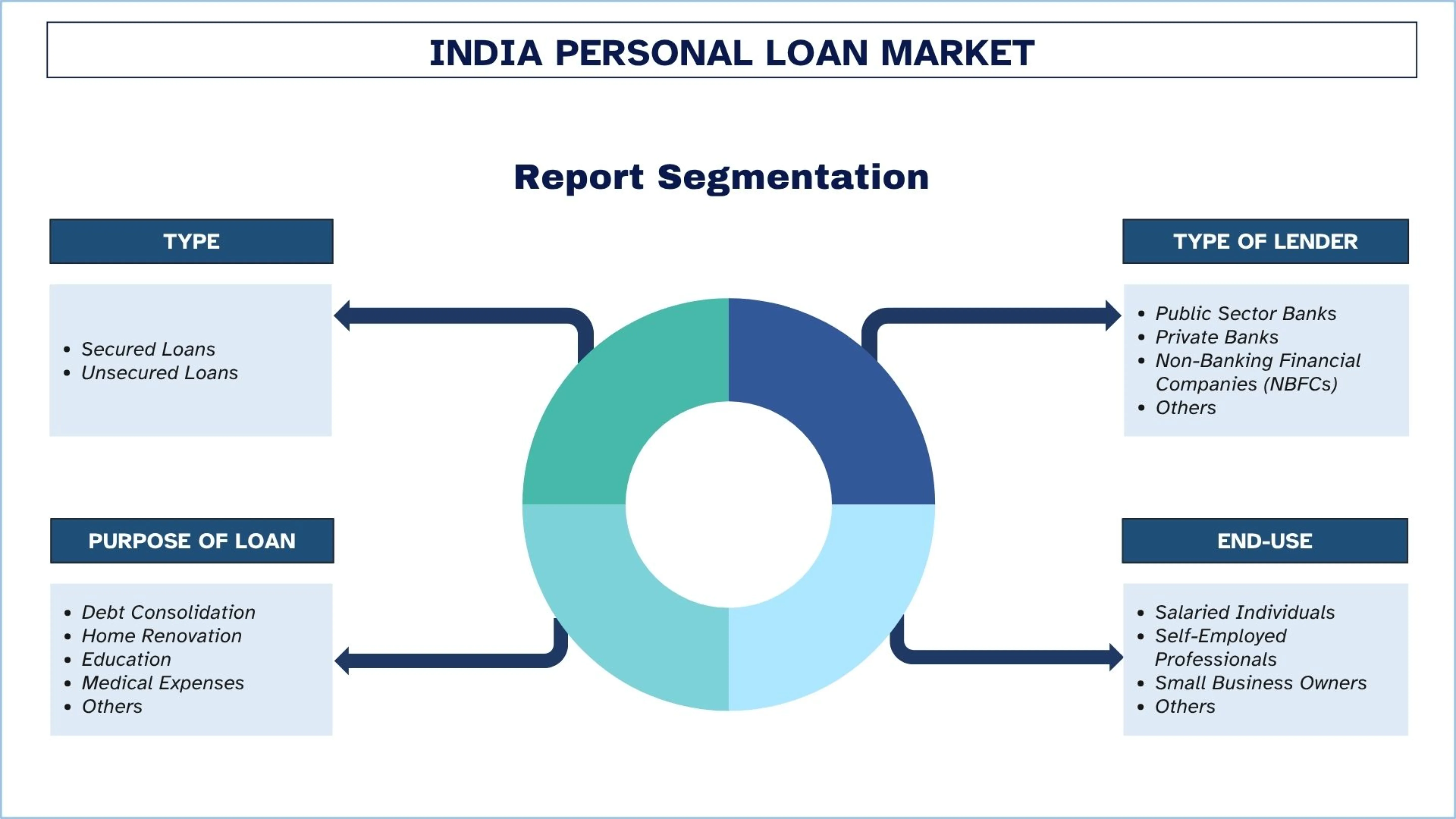
South India held a dominant share of the Personal Loan market.
Personal loan penetration is highest in South India, with Bengaluru, Chennai, and Hyderabad being the leading centers for tech-aware and employed regular borrowers. With IT/ITES companies and fintech specialists in the region, investments can be disbursed in larger amounts and are adopted more rapidly. Due to the developed nature of lending, significant finance companies often see steady expansion and attract good borrowers. On February 27, 2025, South Indian Bank introduced SIB QUICKPL, a fully digital personal loan platform designed for new customers. The platform enables salaried and self-employed individuals with strong credit profiles to secure unsecured personal loans through a paperless process in 10 minutes.
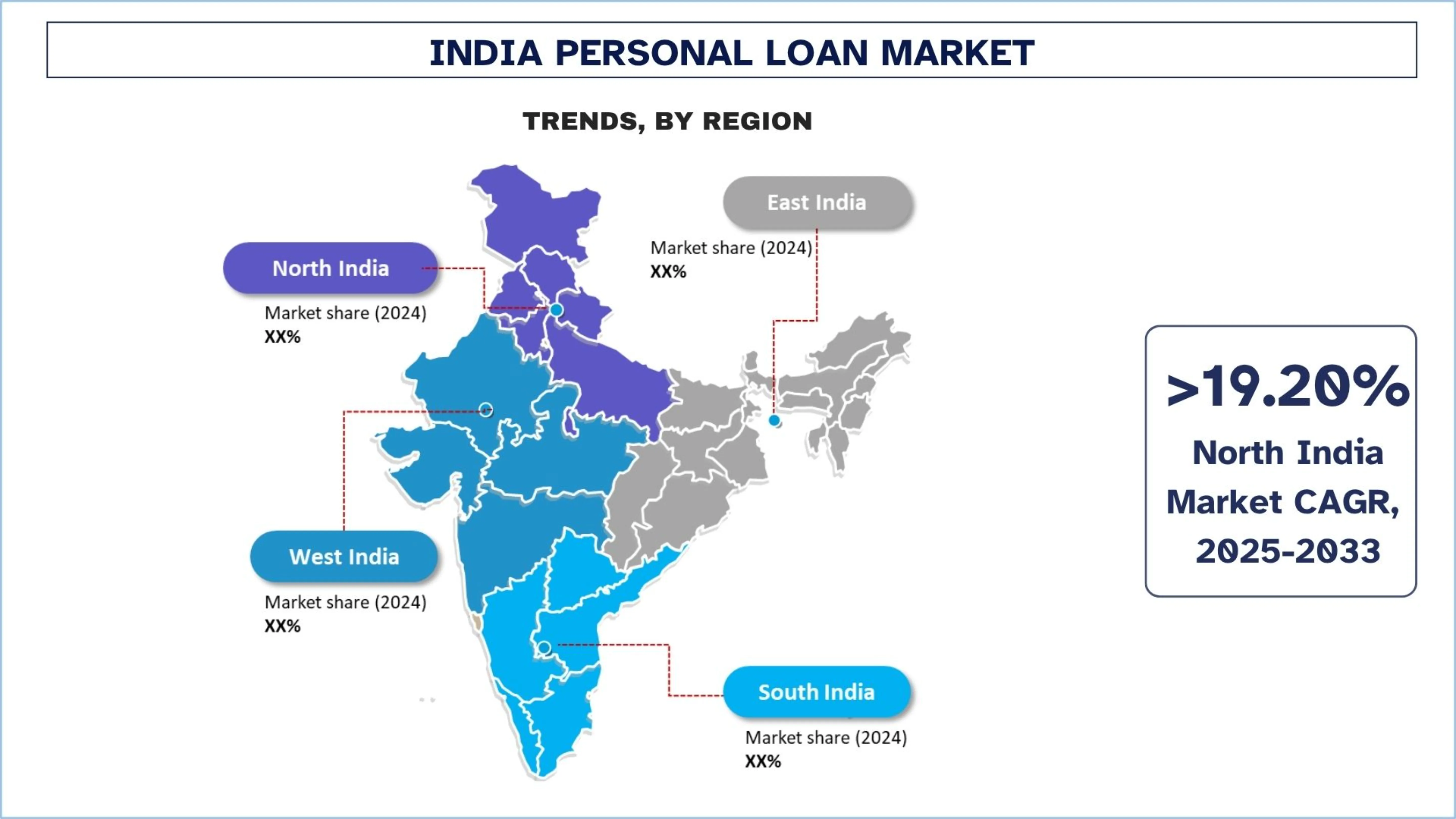
India Personal Loan Competitive Landscape
The India Personal Loan Market is competitive, with several global and international market players. The key players are adopting different growth strategies to enhance their market presence, such as partnerships, agreements, collaborations, new product launches, geographical expansions, and mergers and acquisitions.
Top India Personal Loan Companies
Some of the major players in the market are HDFC Bank Ltd., State Bank of India, ICICI Bank, Axis Bank, Bajaj Finance Limited, Tata Capital Limited, Aditya Birla Capital Limited, MUTHOOT FINANCE LTD., Lendingkart Technologies Private Limited, Finnovation Tech Solutions Pvt. Ltd. (KreditBee).
Recent Developments in the Personal Loan Market
On October 18, 2024, Kotak Mahindra Bank Limited (“KMBL”) announced that it entered into an agreement to acquire the Personal Loan book (“Proposed Transaction”) of Standard Chartered Bank, India, further strengthening its position in the Retail Credit market. As of September 30, 2024, the Proposed Transaction comprises a total loan outstanding of around ₹4,100 crore (equivalent to ~USD 490 million). The Proposed Transaction consists of loans classified as “Standard Loans” as per the Reserve Bank of India (RBI) guidelines.
On July 07, 2022: Punjab National Bank (PNB) introduced ‘Pre-Approved Personal Loan in 4 Clicks and Single OTP ’ on the mobile Banking App PNB One, that unifies multiple services of PNB on a single platform. Customers can now get personal loans with just four clicks and a single one-time password (OTP). The end-to-end digital journey takes less than a minute with instant disbursal in the account.
India Personal Loan Market Report Coverage
Report Attribute | Details |
Base year | 2024 |
Forecast period | 2025-2033 |
Growth momentum | Accelerate at a CAGR of 18.70% |
Market size 2024 | USD ~98,700 Million |
Regional analysis | North India, South India, East India, and West India |
Major contributing region | North India is expected to grow at the highest CAGR during the forecasted period. |
Companies profiled | HDFC Bank Ltd., State Bank of India, ICICI Bank, Axis Bank, Bajaj Finance Limited, Tata Capital Limited, Aditya Birla Capital Limited, MUTHOOT FINANCE LTD., Lendingkart Technologies Private Limited, Finnovation Tech Solutions Pvt. Ltd. (KreditBee). |
Report Scope | Market Trends, Drivers, and Restraints; Revenue Estimation and Forecast; Segmentation Analysis; Demand and Supply Side Analysis; Competitive Landscape; Company Profiling |
Segments Covered | By Type; By Type of Lender; By Purpose of Loan; By End-Use; By Region/Country |
Reasons to Buy India Personal Loan Market Report:
The study includes market sizing and forecasting analysis confirmed by authenticated key industry experts.
The report briefly reviews overall industry performance at a glance.
The report covers an in-depth analysis of prominent industry peers, primarily focusing on key business financials, type portfolios, expansion strategies, and recent developments.
Detailed examination of drivers, restraints, key trends, and opportunities prevailing in the industry.
The study comprehensively covers the market across different segments.
Deep dive regional level analysis of the industry.
Customization Options:
The India Personal Loan Market can further be customized as per the requirements or any other market segment. Besides this, UnivDatos understands that you may have your own business needs; hence, feel free to contact us to get a report that completely suits your requirements.
Table of Content
Research Methodology for the India Personal Loan Market Analysis (2023-2033)
We analyzed the historical market, estimated the current market, and forecasted the future market of the India Personal Loan market to assess its application in major regions in India. We conducted exhaustive secondary research to gather historical market data and estimate the current market size. To validate these insights, we carefully reviewed numerous findings and assumptions. Additionally, we conducted in-depth primary interviews with industry experts across the Personal Loan value chain. After validating market figures through these interviews, we used both top-down and bottom-up approaches to forecast the overall market size. We then employed market breakdown and data triangulation methods to estimate and analyze the market size of industry segments and sub-segments.
Market Engineering
We employed the data triangulation technique to finalize the overall market estimation and derive precise statistical numbers for each segment and sub-segment of the India Personal Loan market. We split the data into several segments and sub-segments by analyzing various parameters and trends, including type, type of lender, purpose of loan, end-use, and regions within the India Personal Loan market.
The Main Objective of the India Personal Loan Market Study
The study identifies current and future trends in the India Personal Loan market, providing strategic insights for investors. It highlights regional market attractiveness, enabling industry participants to tap into untapped markets and gain a first-mover advantage. Other quantitative goals of the studies include:
Market Size Analysis: Assess the current market size and forecast the market size of the India Personal Loan market and its segments in terms of value (USD).
Personal Loan Market Segmentation: Segments in the study include areas of type, type of lender, purpose of loan, end-use, and regions.
Regulatory Framework & Value Chain Analysis: Examine the regulatory framework, value chain, customer behavior, and competitive landscape of the Personal Loan industry.
Regional Analysis: Conduct a detailed regional analysis for key areas such as North India, South India, East India, and West India.
Company Profiles & Growth Strategies: Company profiles of the Personal Loan market and the growth strategies adopted by the market players to sustain in the fast-growing market.
Frequently Asked Questions FAQs
Q1: What is the India Personal Loan market’s current market size and growth potential?
The India Personal Loan market was valued at USD ~98,700 million in 2024 and is expected to grow at a CAGR of 18.70% during the forecast period (2025-2033). This growth is fueled by factors such as rising disposable incomes, digital lending innovations, and increased credit demand across Tier I and Tier II cities.
Q2: Which segment has the largest share of the India Personal Loan market by type?
Unsecured personal loans hold the largest market share in India due to their collateral-free nature, faster disbursal, and increasing preference among salaried and self-employed individuals. Digital lenders and NBFCs have particularly fueled this segment’s expansion.
Q3: What are the driving factors for the growth of the India Personal Loan market?
Major growth drivers include rising middle-class consumer spending, digitization of loan processing, financial inclusion across Tier II & III cities, and low interest rates. Additionally, AI-driven credit assessments and mobile-first lending models are expanding borrower access.
Q4: What are the emerging technologies and trends in the India Personal Loan market?
Key trends include the rise of Buy Now Pay Later (BNPL) and embedded lending models, AI-powered credit scoring, digital-only loan applications, and the use of alternate data for underwriting. These innovations are enhancing loan accessibility and improving customer experience.
Q5: What are the key challenges in the India Personal Loan market?
Challenges include high default risk in unsecured lending, regulatory scrutiny of digital lending platforms, data privacy concerns, limited financial literacy among rural borrowers, and credit risk management for new-to-credit segments.
Q6: Which region dominates the India Personal Loan market?
South India dominates the personal loan market due to its higher urbanization rate, digital adoption, and a strong presence of both public and private banks. States like Karnataka, Tamil Nadu, and Telangana are key contributors due to strong salaried populations and tech-savvy borrowers.
Q7: Who are the key players in the India Personal Loan market?
Leading Companies in India Personal Loan industry include:
• HDFC Bank Ltd.
• State Bank of India
• ICICI Bank
• Axis Bank
• Bajaj Finance Limited
• Tata Capital Limited
• Aditya Birla Capital Limited
• MUTHOOT FINANCE LTD.
• Lendingkart Technologies Private Limited
• Finnovation Tech Solutions Pvt. Ltd. (KreditBee)
Q8: What strategies are companies using to drive growth in the India Personal Loan market?
Leading companies are adopting AI and machine learning for credit scoring, investing in digital lending platforms, and partnering with FinTechs for last-mile connectivity. Many are also expanding into Tier II/III markets with customized small-ticket loan products to tap new demand.
Q9: How is regulatory support impacting the India Personal Loan ecosystem?
The RBI’s digital lending guidelines and efforts to strengthen the credit bureau ecosystem are enhancing transparency and borrower protection. These reforms are promoting responsible lending practices, increasing investor confidence, and driving long-term market stability.
Related Reports
Customers who bought this item also bought



